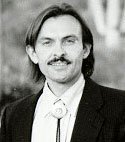|

by Lewis
Mehl-Madrona, M.D., Ph.D.
"Miracles are built on
profound change..."
--Lewis Mehl-Madrona, M.D., Ph.D.
Native American philosophy teaches that all
healing is first spiritual healing. Whatever else we doóincluding
herbs, diet, radiation, surgery, bodywork, or medicationsówe
need to humbly ask for help from the spiritual realm. People
with a spiritual practice do better with any illness than
those lacking religious beliefs; we must make ourselves
available to the Divine for healing. Spirit is a necessary
link in the chain that creates healing and miracles.
Spirit cannot be ignored, whether it is to give our pain back
to the earth or to accept healing from the earth, angels, or
God.
If all healing is fundamentally spiritual,
then we must make ourselves available to God or to the
spiritual realm to be healed. In medieval times the touch of
an angel restored health. It still does today. Ceremony and
ritual provide the means for making ourselves available.
Each spiritual path offers a means for
coming closer to God. Native Americans use the sweat lodge,
the vision quest, and the sun dance. Christians fast and
meditate. Islamics make a pilgrimage to Mecca. Sufis dance
until they drop. However we choose to do it, we must access
this spark that ignites the fire of healing...
Hope and Eliminating Self-Blame
...Eliminating self-blame is so different
from the individualistic concept of the New Age approaches
that tell people, "You created your illness, now, get
over it." From this limited understanding of the
complexity of health and disease, people feel like failures if
they canít heal. The complexity of health and healing is
phenomenal, and our small minds canít control or even begin
to imagine the myriad forces involved in making us sick and
making us well. But everyone is capable of some degree of
personal and spiritual transformation, and even of imagining
the possibility of angelic intervention and miraculous
healing. Miracles are possible, but not something to feel
guilty about if not achieved.
Once we eliminate feelings of personal
blame we must address hope. Hope is hard to define, though we
can immediately recognize those who have it and those who donít,
even if we donít know how we make that distinction. Real
hope is a by-product of creating a sense of peacefulness.
For many years I thought my job as a
physician was to help people get well. I didnít recognize
the importance of peacefulness and of helping people discover
meaning and purpose in whatever experiences they had...
We have all grown up believing that science
and its expertise will save us, and it is sobering when it
doesnít. We are trained to believe in the experts and their
technologies. Our belief in medicine is so strong that we
usually turn to alternatives or to God as a last resort when
conventional treatments have failed...
To kindle the fire of hope I often tell
patients a liberal reinterpretation of a story attributed to
Rumi, the thirteenth-century Persian poet.
Rumi comes to a manís house to see him
and is shocked to find the house almost empty. The master of
the house is sick in bed and he has let the servants go for
the day since he feels too sick to supervise. He has left the
house almost empty and pulled the covers over his head,
becoming the picture of despair. When Rumi finds him he tears
the covers off the man. "Get up!" Rumi shouts.
"Get up quick; Jesus is outside in the marketplace
looking for someone to heal, and it might as well be
you."
This image of Jesus looking for someone to
heal that day, and of Rumi thinking it might as well be his
friend, makes me smile. Rumi demonstrates hope. He knows that
Jesus might not select his friend. He conveys his awareness of
indeterminacy about who Jesus will choose, but he also conveys
the urgency of getting his friend to the right place at the
right time; there is no chance of his friend being chosen if
he is not in the courtyard where Jesus can find him. Hope,
therefore, embodies the belief in possibility without the
guarantee of results.
What I love about Rumiís almost whimsical
story is his awareness that we cannot force healing; all we
can do is put ourselves in the right place to be healed and
hope for the best. That location is simultaneously physical,
emotional, spiritual, and situational.
(excerpts from Coyote Healing: Miracles
In Native Medicine by Lewis Mehl-Madrona, M.D., Ph.D.)
www.greatmystery.org/events/health2.html
*********
LEWIS MEHL-MADRONA, M.D., PH.D.
Lewis Mehl-Madrona holds an M.D. from Stanford University and
has been a practicing doctor for over 20 years. An experienced
healer who has led many Native American healing ceremonies,
Mehl-Madrona has also headed traditional medical clinics,
helping AIDS and cancer patients as well as researching the
benefits of relaxation techniques to aid in the natural
correction of breech positioned babies. He is currently an
Associate Professor of Family Practice at the University of
Hawaii School of Medicine.
Dr. Mehl-Madrona is affiliated with the
Native American Research and Training Center at the University
of Arizona College of Medicine in Tucson. He is a family
physician, geriatrician, psychiatrist, and psychologist, and
has worked many hours in rural emergency rooms. His
best-selling book, Coyote Medicine is about his
struggles to integrate his traditional Native American
heritage (Cherokee and Lakota) with modern medicine. He also
teaches Mind-Body Medicine with Dr. Andrew Weil's program in
Integrative Medicine. www.healing-arts.org/mehl-madrona
Dr. Mehl-Madrona will be one
of the presenters at this conference:
JUST FOR THE HEALTH
OF IT! The Prophets Conference Boulder, Colorado
May 19-21, 2006
(Back)
|